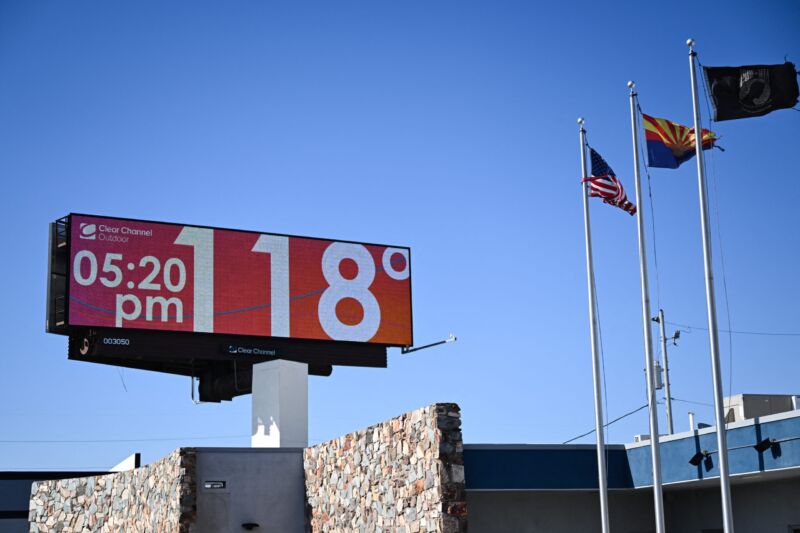Climatologists: July’s intense heat “exactly what we expected to see”
Science / Science & Exploration
Deadly temperatures will become common unless greenhouse gas emissions are cut fast.

A billboard in Phoenix, Ariz. displays the temperature on July 18, 2023, during an unprecedented string of days with high temperatures above 110° F.
Patrick T. Fallon/AFP via Getty Images
Widespread summer heatwaves like those currently baking the Northern Hemisphere, with temperatures soaring above 110 degrees Fahrenheit simultaneously in North America, Asia, and Europe, will be common in just a few decades unless greenhouse gas emissions are immediately curtailed, an international team of scientists said Monday.
If global warming reaches 2° Celsius above the pre-fossil fuel era, such heat waves will happen every two to five years, the researchers said as they released a rapid attribution analysis of the blistering conditions experienced by hundreds of millions of people in recent weeks. If emissions continue on the same increasing path as now for a few more years, the 2° Celsius mark will be passed in about 30 years, according to the new analysis by World Weather Attribution.
In the current climate, warmed by 1.1° C (1.9° F) by humans, these extreme heatwaves are no longer rare, “due to warming caused by burning fossil fuels and other human activities,” the authors wrote. “Events like these can now be expected approximately once every 15 years in North America, about once every 10 years in southern Europe and approximately once every five years in China.”
Their analysis also concluded that greenhouse gas pollution made the European heatwave 2.5° Celsius (4.5° F) hotter, the North American heat wave 2° C (3.6° F) hotter, and the heatwave in China 1° C (1.8° F) hotter. The heat in North America and Europe would have been “almost impossible” without global warming, while the heat in China was made 50 times more likely by the current level of greenhouse gas pollution.
The researchers tested the effect of global warming against several different definitions of heatwaves, like duration and intensity, but that didn’t affect the result very much, said co-author Friederike Otto, a climate scientist with the Grantham Institute at Imperial College, London, who said the aim of the analysis is “to answer the question of the role of climate change in the immediate aftermath or while an extreme weather event is still occurring.”
A series of similar studies the last few years has helped the public understand that dangerous climate change impacts are happening now, not in some distant future, and that they will get worse. In each study, the team includes scientists from the affected regions, she said, adding that, while the current analysis hasn’t yet been peer-reviewed, similar studies in the past were all affirmed by scientific review panels.
“The role of climate change is absolutely overwhelming,” she said. “It’s not surprising these meteorological events are happening at the same time. You expect to see them in the Northern Hemisphere summer. Our emissions have been rising faster and faster in the last few years, so it’s not a surprise to see the responses happening faster and faster. We have known this for a long time and we see exactly what we expected to see.”


No comments:
Post a Comment